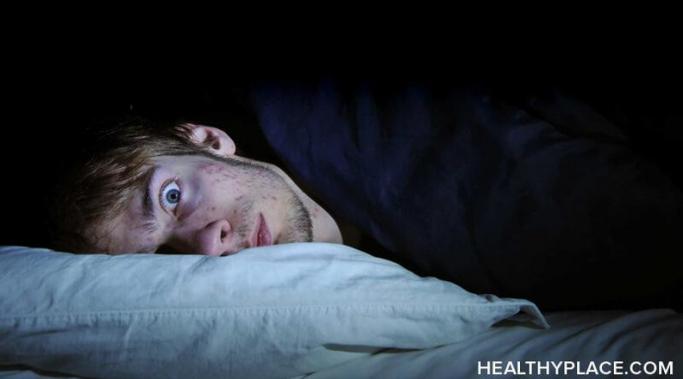When anxiety says you can’t _____ (fill in the blank with whatever it is you think you can’t do), it’s frustrating, and it can be tempting to give up. Why bother trying to move forward when anxiety is screaming at you, attempting to convince you that you can’t do something? There are important reasons we should bother moving forward despite being anxious and believing we can’t do something: We are living our lives, we have goals, passions, and purpose, and anxiety is wrong (12 Lies Anxiety Tells You). You can respond to anxiety to take away its voice. You can respond when anxiety says you can't do something.
Anxiety Symptoms – Anxiety Schmanxiety
Anxiety and exhaustion frequently go hand in hand. Feeling anxious day after day is exhausting, and when we’re so worn out, anxiety worsens because managing it becomes more difficult. The fatigue of anxiety often feels different than the exhaustion of depression. Whereas depression can zap people of energy and motivation and make it difficult to be up and about, anxiety can put people on almost constant alert, leading to a sensation often described as tired and wired. Increasing awareness of anxiety and exhaustion can help you take measures to feel better physically, mentally, and emotionally.
It can be surprisingly difficult to know when you need anxiety help. Sometimes we are agitated, second-guessing ourselves, worrying about our mistakes or how we’re perceived or that something bad will happen. Yet despite this nagging anxiety, it’s common to wonder if you need anxiety help or if the anxiety is just something to deal with until it passes. Here, learn ways to tell if you need anxiety help.
If you find yourself anxious in many different situations, especially those that relate to your performance, behavior, or relationships with others, you might consider the possibility that you have unrealistically high standards for yourself. It’s not uncommon for people to hold themselves to high standards, and doing so can be motivating. Impossibly high standards, though, can make people anxious and interfere in their lives (How Not to Expect Too Much from Yourself). If your own high standards are making you anxious, there’s a way to reclaim your life.
Worrying about mistakes goes hand-in-hand with anxiety (Worry: How Much is Too Much?) and we need to learn to stop worrying over spilt milk. As irksome as they can be, mistakes are simply events, incidents in our lives, but they don’t need to become our lives, taking over our wellbeing. How we react to mistakes affects our mental health. To reduce anxiety, including generalized anxiety disorder, it's important to stop worrying about mistakes.
Is it possible to distract yourself from fear? Fear is a basic human reaction, an instinct even, to something we perceive as a threat to our safety or general wellbeing. It sounds an alarm in the brain and kicks the fight-or-flight response into gear. When we are afraid, we want to run from what it is that's making us feel scared, or we want to confront it and do battle. Our instinct typically isn't to ignore fear by distracting ourselves with something else. Can you distract yourself from fear? Do you want to?
I must admit, anxiety-related procrastination plays a part in my life. There are far too many days when I find it very hard to cope with the complicated, impossibly fast push and pull of life. I can feel as though the world is too big and frightening and all I want to do is focus on the tiny acts of nurturing that help me cope minute to minute: nursing a large cup of tea, taking a nap or hiding in the bathroom to get away from the feeling of eyes and supposed scrutiny all around. These things look and feel like procrastination due to my anxiety.
Guilt is a distressing effect of anxiety. Guilt is the uncomfortable experience of self-flagellation for thinking, feeling, doing, and generally just existing,wrong (These Awful Effects of Anxiety Must Stop). Anxiety is the loud, critical voice in our head that provides a running commentary on the things we do wrong (wrong from anxiety's perspective, that is). As if it weren't bad enough to worry, fret, and fear that we've done something wrong, anxiety takes our discomfort to a new level. A very distressing effect of anxiety is guilt.
Anxiety can make us say mean things, regrettably, no matter how nice we are. I would say that I am a nice person. Indeed, I would go as far to say that my “niceness” is often viewed as a defining characteristic to my closest friends. As far as I know myself, this isn’t just appearances. I do care deeply about people and feel a great sadness when learning about other people’s unhappiness and disappointments. I cannot bear to hear stories of loneliness and abandonment. I do not think that I have ever intended to hurt anybody or that I have ever taken pleasure in another person’s unhappiness. But I have said mean things when anxiety got the better of me.
Anxiety lies to you. It tells you lies in order to bully you and control you. A common complaint among people living with one or more anxiety disorders is that they can't get the racing thoughts of anxiety out of their head. A reason for this is that anxiety, seemingly without stopping, feeds lies directly into your brain. When we’re told something over and over and over again, we start to believe it. By telling you certain lies, anxiety strengthens itself so it can keep a hold on you and your life. See if you recognize any of these 12 common lies anxiety tells.









